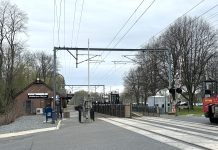By John Burton
RED BANK – It was a win for the borough and Red Bank RiverCenter over NJ Natural Gas, but that doesn’t mean the winners will get their way.
The Appellate Division of the state Superior Court ruled Tuesday, Oct. 28, in favor of the borough and RiverCenter, which manages the borough’s commercial special improvement district, concerning their objections to the gas utility which moved forward in 2012 and installed aboveground gas equipment through much of the borough’s downtown business districts without first obtaining construction permits from the borough.
But the fact remains the equipment has been installed and operating without any problems, according to a gas company spokesman.
In overturning a lower court ruling, the appellate court determined that NJ Natural Gas did need to obtain borough approval to proceed with its work. The borough and RiverCenter had maintained that the utility needed the permits to remove below-ground equipment and install aboveground – and highly visible – equivalents that objectors said were unsightly.
“I liken this to David versus Goliath,” Mayor Pasquale Menna said as the decision became public on Tuesday. The decision has statewide ramifications should local government and public utilities conflict, he said.
But NJ Natural Gas’ position is that the work was done for public safety purposes and has been completed. The utility has no reason to revisit the work, said Michael Kinney, a NJ Natural Gas spokesman.
“Safety is something we take very seriously,” Kinney said.
NJ Natural Gas installed 88 aboveground gas regulators for commercial customers on Broad, Monmouth and White streets, removing the below ground ones and covering the pit area with sidewalk pavers, according to Kinney.
The project cost the gas company approximately $150,000, he said.
Kinney said this week and previously, the work was necessary because corrosion was discovered on some of the aging gas equipment here and in other communities, increasing the risk of gas leaks. Installing the aboveground equipment made them safer for the public and with easier access and increased safety for work crews.
The gas regulators stand about knee-high and channel high-pressure natural gas to the customers.
Back in 2011, officials and the business community offered their opposition to the installation of sidewalk units when company officials said they did not need to obtain borough construction permits. Borough officials and RiverCenter argued a great deal of effort and money had been spent on downtown streetscape work while redeveloping the area, making it a premiere destination.
Menna has called the equipment ugly and compared them to a “horse hitch.”
“You have this monstrous carbuncle coming out of the ground,” was how Menna described the regulators this week.
“I think there was real damage to the streetscape” by the work, James Scavone, RiverCenter’s executive director, said this week.
Local officials also maintained the new equipment could impact public safety because they could take up sidewalk space and be vulnerable to damage from vandalism and traffic mishaps.
While the aesthetics issue is not insignificant, Menna said, the other issue at hand is local control when dealing with powerful utilities, which strikes at the heart of the issue.
“I think it is a shot that had to be fired across the bow,” Menna said this week.
Menna and state Senator Jennifer Beck, R-Monmouth, who represents the borough, had charged that the gas company was taking a particularly hard line on the issue, unwilling to discuss the matter or provide evidence to support its position that the work was necessary for safety considerations.
Menna alleged it likely has more to do with the utility’s economics rather than safety and it showed “unbridled authority to take over the public right-of-way” on the part of NJ Natural Gas.
NJ Natural Gas has 45 days to seek an appeal of the decision, according to Menna.
However, Kinney insisted there is no reason to appeal as the court’s ruling doesn’t direct the utility to take any action.
After 45 days, the borough could possibly issue violations for the work already done, Menna warned. But, he hoped, there could be discussions on how to address the dispute.
“I think there are ways to ameliorate this,” Menna said. “We never had that discussion.”
Kinney said, “We are always willing to work with the communities we serve.”
Scavone said that, “in an ideal world, sure,” he would like to see the gas company remove the equipment and reinstall below-ground equipment. “But, I don’t know if that’s a reality.”














